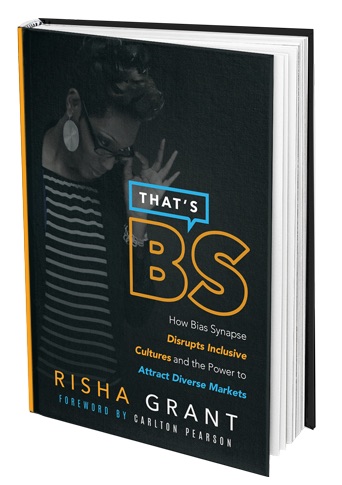For minority authors, a book can generate respect and counteract bias

Why should older white men get all the respect?
I’ve been talking to a diverse collection of executives, thinkers, and authors: men and women; old and young; white, black, Hispanic, and Asian; North American, European, Asian, and Australian.
Here’s a shocker: if you’re seeking attention for your ideas, it’s easier if you’re an older, white, American man.
Bias is real. Women with ideas are less likely to get credit for them. Black leaders and CEOs told me about showing up at clients’ offices where receptionists didn’t believe they were who they said they were. Europeans wonder why Americans think all ideas originate on their side of the Atlantic. Asians fight a perception that leaders don’t look like them.
Risha Grant, diversity expert and author of That’s BS, cites the phenomenon of “bias synapse.” Our personal experience biases us against seeing the leadership or value in people who don’t look like the the leaders we’ve worked with.
I can’t solve this problem. But if you’re a leader with an idea — and you’re not an older white guy — perhaps you can.
Authors of nonfiction books get respect. They’re more likely to get speaking slots and appear on panels. People talk about their ideas, even when they’re not in the room. An author has, by definition, created a book length analysis of something worth talking about. If the book is good, the author gets the credit.
When a reader is reading your book, no one is talking over you, no one is shouting you down, and no one is trying to take credit for your idea. Out in the world, you face these challenges, but on the page, you get to say what you want.
A young author can demonstrate the maturity of her ideas and get credit for her research.
A black author can fight prejudice and get respect he’s been denied with a well-written, well-argued book.
An Asian author can gather a following and demonstrate leadership.
An author from outside North America gets the chance to insert ideas into the global conversation — and can colonize American conversations.
And a woman author gets the chance to make her points on a level playing field of ideas.
Bias is bias. But being an author is one way to blast past it.
Yes, but can you get published?
If you think women or minority authors have weaker ideas, stop reading now and get off my blog. There is no evidence for that, and it’s a reprehensible prejudice.
I also think that publishers have less bias than the rest of us. If a book will sell, they want to publish it.
So why are there disproportionately fewer minority authors?
I believe the answer is that there are fewer credible and publishable book proposals from young and minority nonfiction authors.
If this is you, here are a few ideas you can pursue to increase your chances of getting published:
- Do your research. Gretchen McCulloch gets to write a book about Internet language because she did the research. So did danah boyd in an earlier era. Zeynep Tufekci got her respect based on reporting from the front lines. Any bozo can have an idea. It takes work to support your idea with research, argumentation, case studies, and reporting. Do the work. Especially for young authors, this is what it takes to break through.
- Network. You know somebody who can help you get recognition. Or at least you might — if you tried to find them. Go to the conferences. Go to the parties. Comment on the blog posts. Respond to the tweets. Authors like to help each other — so respond to authors. If you impress one, she’ll introduce you to her publisher.
- Build a platform. Publishers won’t publish an unknown author of color — but they won’t publish an unknown white person, either. What makes the difference is the size of your platform. That platform could include a column in a publication, a speaking career, a popular blog, a great podcast, a Twitter following, an Instagram following, a popular series on YouTube, a newsletter . . . or any combination of these. Publishers seek to leverage popular authors, not create them. So do the work to build a following for your ideas.
- Shortcut the publishing process. You don’t necessarily have to persuade a publisher. A hybrid publisher gives you nearly the same clout and reputation — but you’ll have to pay them. Self-publishing is even easier and quicker. A self-published book won’t by itself gain you the respect you deserve, but if you do a quality job, it will help boost your popularity and your network and position you to get a traditional publisher on the next go-round.
None of this is easy. But it is possible. Becoming a published author ushers you into the club. Once you’re inside, it’s a lot easier to get the respect your ideas deserve.